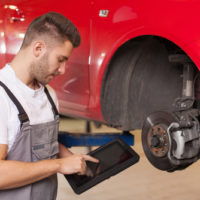Car Makers Commit to Making Automatic Emergency Braking Standard on New Cars

According to an announcement made by the National Highway Traffic Safety Administration (NHTSA), the bulk of the auto manufacturers selling cars in the U.S. have committed to making the safety system known as Automated Emergency Braking (AEB) a standard feature on all new vehicles in the coming years. The group of 20 car makers has committed to including the feature on nearly all new cars by September of 2022.
AEB systems use cameras, radar, and lasers to scan for hazards in the road. When the system identifies an object, slowing vehicle, or pedestrian with which it appears that the car may collide, the system will issue a warning to the driver that evasive maneuvers are necessary. If the driver fails to take sufficient action, the car will either apply the brakes or increase the existing pressure on the brakes as applied by the driver. A related safety feature, known as the Front-Crash Warning (FCW) system, will scan the road in a similar manner to an AEB system and will warn the driver of an imminent collision, but cannot brake the car automatically.
Safety organizations are enthusiastic about the commitment. “The benefits of this commitment are far-reaching — from injuries and deaths averted to the recovery of productivity that would otherwise be lost in traffic jams caused by the crashes prevented. It also assures that all Americans will benefit from this technology,” said David Zuby, the Chief Research Officer of the Insurance Institute for Highway Safety (IIHS).
The enthusiasm for AEB systems is backed up by a substantial amount of research. According to multiple IIHS studies, both FCW and AEB systems are powerful tools in preventing vehicle accidents. One IIHS study showed that cars with FCW systems were 23% less likely to be involved in a police-reported crash, and cars with an AEB system were 39% less likely to be involved in such an accident. AEB-equipped cars were even found to be 43% less likely to be involved in an injury accident. While this is a substantial advance in vehicle occupant protection, crash-avoidance systems do not relieve drivers of the obligation to remain attentive on the road. Experts warn that, while the systems are effective, they are vulnerable to the occasional failure. A driver relying on their car’s AEB system who fails to pay attention while behind the wheel will nevertheless face liability for failing to prevent an accident which they should have foreseen, even if the AEB system malfunctions.
For assistance in recovering damages from your New Jersey car accident, contact the trial-ready and experienced Wayne personal injury lawyers at Massood Law Group for a free consultation on your claims, at 973-696-1900.

